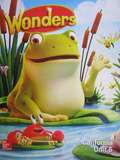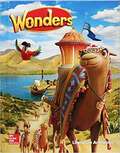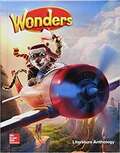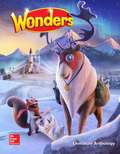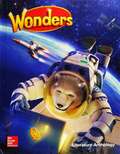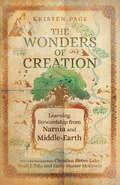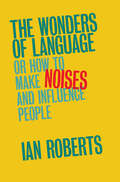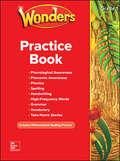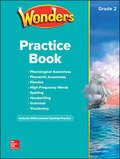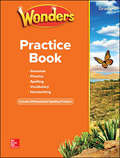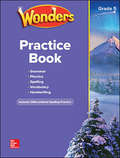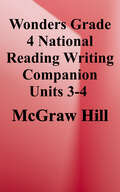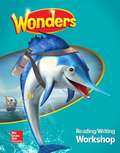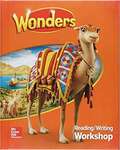- Table View
- List View
Wonders, Grade K [Unit 6], Reading/Writing Workshop
by Donald R. Bear Janice A. Dole Jana Echevarria Douglas Fisher David Francis Vicki Gibson Jan E. Hasbrouck Margaret Kilgo Jay McTighe Scott G. Paris Timothy Shanahan Josefina Diane AugustNIMAC-sourced textbook
Wonders Literature Anthology: Grade 3
by McGraw HillWith the Wonders Literature Anthology, students apply their skills and strategies to rich authentic text, with stories and informational selections by award-winning authors and illustrators. <p><p> This volume helps students integrate knowledge by reading across texts using the anchor text and its paired selection for each week; builds on the theme, concept vocabulary, and comprehension skills and strategies of the Reading/Writing Workshop; and expands students’ exposure to a broad array of genres.
Wonders Literature Anthology, Grade 4
by McGraw HillWith the Wonders Literature Anthology, students apply their skills and strategies to rich authentic text, with stories and informational selections by award-winning authors and illustrators. This volume helps students integrate knowledge by reading across texts using the anchor text and its paired selection for each week; builds on the theme, concept vocabulary, and comprehension skills and strategies of the Reading/Writing Workshop; and expands students’ exposure to a broad array of genres.
Wonders Literature Anthology, Grade 5 (Elementary Core Reading)
by Donald Bear McGraw HillWith the Wonders Literature Anthology, students apply their skills and strategies to rich authentic text, with stories and informational selections by award-winning authors and illustrators. This volume helps students integrate knowledge by reading across texts using the anchor text and its paired selection for each week; builds on the theme, concept vocabulary, and comprehension skills and strategies of the Reading/Writing Workshop; and expands students’ exposure to a broad array of genres.
Wonders Literature Anthology, Grade 6
by McGraw HillWith the Wonders Literature Anthology, students apply their skills and strategies to rich authentic text, with stories and informational selections by award-winning authors and illustrators. This volume helps students integrate knowledge by reading across texts using the anchor text and its paired selection for each week; builds on the theme, concept vocabulary, and comprehension skills and strategies of the Reading/Writing Workshop; and expands students’ exposure to a broad array of genres.
The Wonders of Creation: Learning Stewardship from Narnia and Middle-Earth (Hansen Lectureship Series)
by Kristen PageWhen an author of fiction employs the imagination and sets characters in a new location, they are in a sense creating a world. Might such fictional worlds give us a deeper appreciation for our own?Many readers have found themselves, like the Pevensie children, transported by C. S. Lewis into Narnia, and they have traveled from Lantern Waste to Cair Paravel and the edge of the sea. Thanks to J. R. R. Tolkien, readers have also journeyed with Bilbo, Frodo, and their companions across Middle-earth from the Shire to the Lonely Mountain, the forest of Mirkwood, the mines of Moria, and the very fires of Mount Doom. But as often as we enter these fictional worlds as readers, we eventually return to our world refreshed with sharpened insight.The Wonders of CreationBased on the annual lecture series hosted at Wheaton College's Marion E. Wade Center, volumes in the Hansen Lectureship Series reflect on the imaginative work and lasting influence of seven British authors: Owen Barfield, G. K. Chesterton, C. S. Lewis, George MacDonald, Dorothy L. Sayers, J. R. R. Tolkien, and Charles Williams.
The Wonders of Language
by Ian RobertsIan Roberts offers a stimulating introduction to our greatest gift as a species: our capacity for articulate language. We are mostly as blissfully unaware of the intricacies of the structure of language as fish are of the water they swim in. We live in a mental ocean of nouns, verbs, quantifiers, morphemes, vowels and other rich, strange and deeply fascinating linguistic objects. This book introduces the reader to this amazing world. Offering a thought-provoking and accessible introduction to the main discoveries and theories about language, the book is aimed at general readers and undergraduates who are curious about linguistics and language. Written in a lively and direct style, technical terms are carefully introduced and explained and the book includes a full glossary. The book covers all the central areas of linguistics, including phonetics, phonology, morphology, syntax, semantics and pragmatics, as well as historical linguistics, sociolinguistics and psycholinguistics.
Wonders, Practice Book, Grade 1
by McGraw-Hill EducationNIMAC-sourced textbook <P><P>Blackline masters that provide multiple opportunities for students to master skills and strategies. The Practice Book features phonological awareness, phonemic awareness, phonics, spelling, handwriting, high-frequency words, category words, and grammar practice for each week of instruction, plus take-home stories.
Wonders, Practice Book, Grade 2
by McGraw-Hill EducationNIMAC-sourced textbook <P><P>Blackline masters that provide multiple opportunities for students to master skills and strategies. The Practice Book features phonological awareness, phonemic awareness, phonics, spelling, handwriting, high-frequency words, category words, and grammar practice for each week of instruction, plus take-home stories.
Wonders, Practice Book, Grade 3
by McGraw-Hill EducationNIMAC-sourced textbook <P><P>Blackline masters that provide multiple opportunities for students to master skills and strategies. The Practice Book features phonological awareness, phonemic awareness, phonics, spelling, handwriting, high-frequency words, category words, and grammar practice for each week of instruction, plus take-home stories.
Wonders, Practice Book, Grade 5
by McGraw-Hill EducationNIMAC-sourced textbook <P><P>Blackline masters that provide multiple opportunities for students to master skills and strategies. The Practice Book features phonological awareness, phonemic awareness, phonics, spelling, handwriting, high-frequency words, category words, and grammar practice for each week of instruction, plus take-home stories.
Wonders Reading/Writing Companion
by McGraw HillThis interactive student edition ensures students read with pencil in hand, collaborate with partners, and write whenever they read. Students master the close reading routine, respond to texts, apply skills and strategies, talk, cite text evidence, and write.
Wonders, Reading/Writing Workshop, Florida Edition
by McGraw Hill*This textbook has been transcribed in UEB, formatted according to Braille textbook formats, proofread and corrected. <P><P>
Wonders Reading/writing Workshop, Grade 3
by McGraw HillThe Reading/Writing Workshop provides students with powerful systematic support for the close reading of short complex texts with core lessons all in one place. Each volume introduces the week’s concept with photographs, interactive graphic organizers, videos, and more; teaches and models elements of close reading with shared short complex texts; allows for flexibility and efficient use of instructional time; and includes a grammar handbook in every volume starting at Grade 2.

